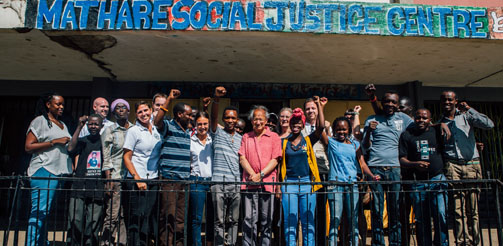World Social Justice Day is a moment to reflect on the ideal of ‘a society for all’, one based on respect for all human rights and fundamental freedoms. And it is an opportunity to learn from rights defenders about how to translate this ideal into real changes. What is needed to enable marginalised citizens to challenge social injustices? 
A closer look at a recent learning partnership between action researchers working on citizen engagement and an urban grassroots movement in Kenya offers insights about how applied research can support citizen-led change in defence of human rights.
Bunge la Mwananchi (the People’s Parliament) – a grassroots movement which enables its members to defend their rights and gain access to basic needs and social justice – was born during the social and political struggles of the 1990s, when people from Kenya’s marginalised classes began to come together in urban public spaces to organise themselves to demand equality.
Bunge was part of the wider changes that led in 2010 to Kenya adopting one of the most progressive constitutions in the world, which includes commitments to wide-ranging economic and social rights.
Yet systematic change in the conditions of social injustice that affect many of Kenya’s citizens has been slow to follow.
Three linked steps for learning and action help Bunge la Mwananchi adapt to new social and political challenges
Making All Voices Count, the programme on which I work, began its engagement with Bunge in 2015, when IDS Fellow Patta Scott-Villiers started working with members to create space for discussion about the new challenges the movement was facing, and how it might evolve and adapt.
A series of three linked activities evolved from these first conversations. Each triggered Bunge to make changes to its own approaches, and each contributed new layers of our understanding of how citizens can claim social justice.
- An action research project was launched to create spaces and cycles of reflection and action about the fault lines and solidarities within Bunge la Mwananchi (read the IDS Bulletin article for more on detail on the research). One challenge identified was a need for mentoring amongst younger Bunge members.
- So, the Social Justice and Movement Building Fellowship Programme was set up, during which young Bunge members living in the Mathare and Kangemi slums of Nairobi learned about the theory and practice of social justice work, including how to document and report rights violations.
- One way to do this documenting was by using participatory video. IDS Fellow Jackie Shaw worked with a group of Bunge members, training them participatory video techniques. They learned to use video to share stories within and beyond their communities, and to connect across communication divides.
This video, “Amplifying Social Struggles”, weaves these threads together and summarises what they mean to Bunge la Mwananchi:
Three changes to support citizen-led change in defence of human rights
What changed as a result of these activities?
1: Participatory video shares learning and builds up people’s skills
Bunge members are now using participatory video to initiate discussions in Bunge spaces and to connect across communication divides – as well as in documenting evidence for human rights campaigning.
It has also become an important resource for sharing skills. Bunge have used video to build capacity amongst members for writing and presenting petitions about human rights violations that are based on an understanding of constitutional rights.
2: People gain courage to challenge the normalisation of rights abuses Long-time Bunge leader Gacheke Gachihi says that one of the biggest obstacles to citizen engagement on social justice is normalisation of human right abuses – no-one expects the perpetrators of extra-judicial killings, for example, to be held to account.
“In informal settlements,” he says “it’s really hard to approach a police station with a bad reputation for human rights abuses.”
Gradually, however, Bunge members – having learned more about their constitutional rights and how to petition authority – have gained confidence, and begun to petition.
“More citizens are recognising that human rights violations do not have to be ‘normal’”, says Gacheke, “and it has emboldened and encouraged them to take action.”
3: New spaces to bring light to rights abuses and demand responses
The shifts triggered by the action research have contributed to the formation of various spaces within the community that are used to enhance the work of Bunge la Mwananchi, including the Mathare Social Justice Centre, a registered community-based organisation.
Co-creating a new civic space has helped Bunge act as a convenor for pursuing human rights violations.
This has led to some cases of human rights violations being taken up by the Independent Police Oversight Authority and the Kenya National Commission on Human Rights, with several cases now being investigated.
So, are these changes significant?
Changes like these are significant when they are interlinked, and become more than the sum of their parts.
Wangui Kimari, of the Mathare Social Justice Centre, has written about why such linked changes are important in building citizen action for social justice:
“Community documentation of human rights abuses is important because it allows us to use all of our resources and show the utility of everyone in fighting for justice… As we do community research, a type of research which is better because it is informed by people’s experiences, we are able to have a more comprehensive picture of the kind of injustices that have become normalised.
We want to document [abuses] to show how they have been going on with impunity within our communities … But also how this connects to broader structural violence… It gives us a way to move forward to action that’s more grounded, more ethical, and has greater impact for all community members.”
Image: members of Mathare Social Justice Centre. Credit: Mutunga Al-amin.
Karen Brock wrote this blog based on conversations and written contributions from Gacheke Gachihi (Bunge la Mwananchi), Hannah Hudson (IDS / Making All Voices Count), Wangui Kimari (Mathare Social Justice Centre), Patta Scott-Villiers and Jackie Shaw (IDS).
